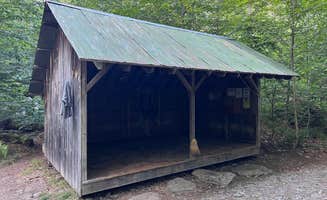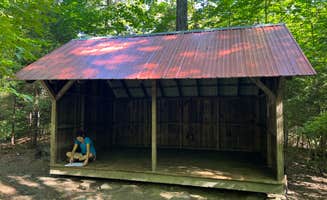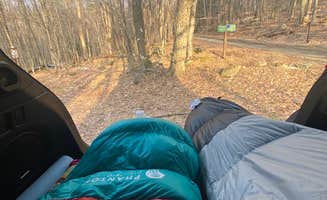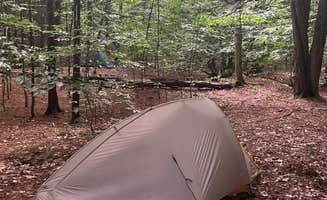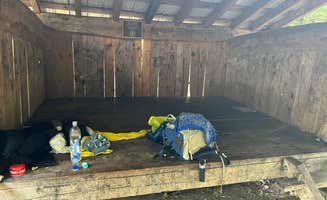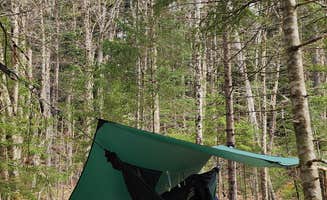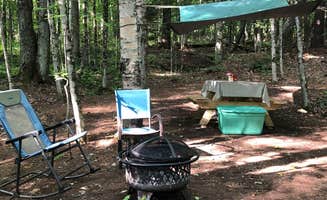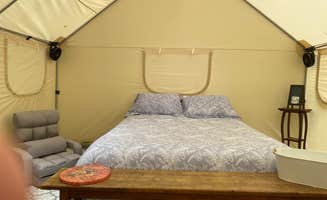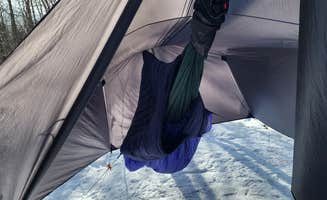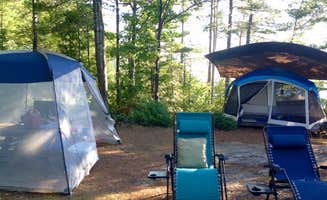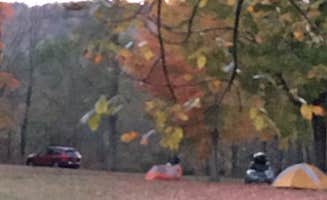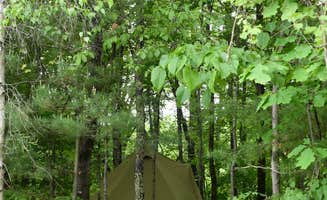Primitive camping near Bridgewater Corners, Vermont centers around Green Mountain National Forest and segments of the Appalachian Trail. The region sits within the eastern slopes of the Green Mountains, with elevations ranging from 600 to 2,000 feet across most dispersed camping areas. Spring conditions often produce muddy access roads from snowmelt runoff, while summer offers more reliable forest floor conditions for tent placement.
What to do
Swimming opportunities: Michigan Brook offers accessible swimming holes during summer months. "Love this site! The very last spot on the right hand side. If you've reached the closed gate you've missed the site," notes one camper at Last Light on Michigan Brook.
Forest exploration: The network of trails throughout Green Mountain National Forest provides day hiking options from most primitive campsites. "Nice area to stay in for access to the National forest. Beautiful stream close by," reports a visitor to Bingo camping area, which provides convenient forest access points.
Bird watching: The pond at Little Rock Pond Group Camp offers wildlife viewing opportunities. "The pond is surprisingly warm for its altitude and it's home to two Common Loons," shares a camper who frequented the site during warmer months.
What campers like
Double-decker shelter options: The two-story shelter at Happy Hill Backcountry Shelter provides versatile sleeping arrangements. "The loft was nice since folks could decide to sleep up there while others were down below, either cooking, arriving, or departing," according to one backpacker.
Swimming holes: The natural water features add recreational value to camping experiences. One visitor to Michigan Brook noted: "Drive in about a mile after the parking lot!! Can use car to get in! There's 3 camping spots. 1 before the bridge and 2 after the bridge! The one before the bridge that's right next to the river is the best one!!"
Bear boxes at select sites: Some backcountry areas provide food storage infrastructure. A hiker at Stony Brook Backcountry Shelter mentioned, "There was also a bear box here, which I hadn't seen at other shelters along the AT in Vermont (heading southbound)."
What you should know
Road conditions vary significantly: Michigan Brook Road becomes challenging during certain seasons. "Road goes in pretty far. Some parts are muddy and very rough. Higher clearance would be advised!!!" warns a recent visitor, highlighting access limitations.
Seasonal water sources: Spring availability can be inconsistent at higher elevations. A camper at Happy Hill noted, "There wasn't any water at the source while I was staying here and it looks like a seasonal source."
Navigation challenges: Without cellular connectivity, paper maps become essential. "This location does not provide cell phone service or WiFi connection," reports a winter camper at Michigan Brook Road Camping, though they noted cell service is available at the main road.
Tips for camping with families
Adequate tent areas: Some shelters feature expanded capacity. "For camping, there were a few large tent areas where multiple tents could fit and which looked quite level," notes a visitor about camping opportunities at AT shelters.
Water safety planning: Carry water or confirm sources before arrival with children. A camper at Velvet Rocks Shelter mentioned, "The water source here was dry during my trip which was expected during the drought."
Swimming options for children: Little Rock Pond Group Camp provides family-friendly water activities. "Easily my favorite campsite in the Northeast! There's a huge jumping rock on the far side of the pond," writes an enthusiastic visitor.
Tips from RVers
High-clearance vehicles recommended: Lower profile RVs face challenges on forest service roads. A Michigan Brook visitor advised, "Beware that in Spring the road gets muddy and quite rutted, I would not recommend driving down there with a car that is low to the ground."
Limited turnaround areas: Advanced planning for RV navigation is crucial. "This area is big enough to bring an RV if you can get it down the dirt road," notes one camper, though they caution about seasonal road conditions.
Winter access limitations: Snow accumulation restricts motorized access to many sites. "However if you would like to continue down the service road during winter months I would highly recommend snowshoes or a snowmobile," warns a winter visitor who attempted vehicle access.


